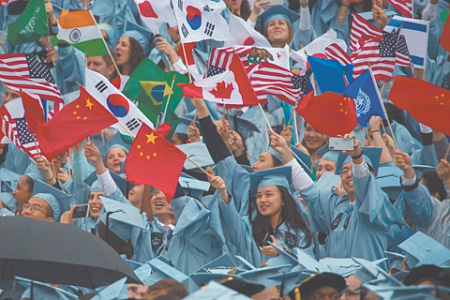
The Trump administration has launched a sweeping crackdown on international students participating in political protests on American university campuses. This escalating conflict threatens to upend the lives of over a million students and challenge the standing of prestigious U.S. institutions, placing a $44 billion sector of the American economy at risk of a major exodus.
For years, higher education in the United States has been a coveted prize for young people worldwide, seen as a gateway to prestigious careers. This dynamic is now under severe strain. The administration has intensified its long-held view of elite universities as hubs of political opposition, particularly in the wake of widespread campus protests related to the Israeli-Palestinian conflict. The White House has accused universities of fostering hostile environments and allowing educational activities to be disrupted.
The government’s response has been direct and severe. Prominent political figures, including Senator Marco Rubio, have warned that protesting foreign students will face immediate consequences, including the annulment of their visas. The administration’s official stance is that these actions target prohibited political activity, a violation of student visa terms, rather than the students’ nationalities. As a result, the State Department is reviewing all student visas, with reports of cancellations, arrests, and deportations already emerging.
Harvard University has become a flashpoint in this battle. The Department of Homeland Security has reportedly revoked the university’s authority to admit new international students, accusing it of failing to protect Jewish students amidst the protests. The institution has allegedly lost $200 million in federal subsidies, and its 6,700 international students—comprising nearly 30% of the student body—face an uncertain future, advised to transfer or risk deportation if they protest the measures.
The impact is being felt far beyond Harvard, with other major institutions like New York University, Columbia University, and the University of Southern California also in the crosshairs due to their large international student populations. Immigration services have reportedly been instructed to slash the issuance of new student visas by as much as 30%, especially for applicants from certain “problematic countries.”
This policy shift directly affects the over 1.1 million foreign students currently in the U.S., whose tuition and living expenses contributed $44 billion to the economy last year. The largest student populations from India and China, who predominantly enroll in computer science and engineering programs, are now caught in the political crossfire. Beyond the immediate threat to current students, analysts project a potential long-term decline in international enrollment of over 10% in the coming decade.
The administration insists that it still welcomes qualified foreigners who remain focused on their studies and stay out of politics, promising them future opportunities with American companies in their home countries. However, this hardline stance has created a climate of fear on campuses. Many students are now actively exploring transfers to other U.S. universities or looking to continue their education in Canada and Europe, signaling a potential seismic shift in America’s role as the world’s leading destination for higher education.
